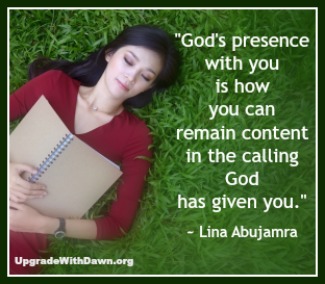6 Ways to Grin When You'd Rather Grit Your Teeth!
I met Kathy Carlton Willis at a writer's conference and was so impressed with her life, not just her teaching. She shines for Jesus! And in this Attitude UPGRADE, she shares one way we reflect God's light too.
"Most of us deal with situations that make us want to grit our teeth on a regular basis. Or at least  bite our tongues!" Kathy says. "Here are six ways you can grin with grace instead."
bite our tongues!" Kathy says. "Here are six ways you can grin with grace instead."
I (Dawn) have watched Kathy endure trial after trial over the past several years and noticed how she smiles despite the circumstances. So I’m curious how she’s learned to grin with grace instead of grimace—which is our natural human tendency. Let’s see what she has to say.
Kathy continues . . .
As I sat down to write this piece for you, I started out as an “expert.” I’m the Grin with Grace gal. I’ve studied all the grace words in the Bible. Written a book. Put together a script and performed a 7-session DVD. I should know it all when it comes to grinning with grace, right?
But before I could even organize my thoughts for this article, I received a note that derailed me. Someone cancelling a commitment with almost no notice for me to come up with Plan B. And two days ago the surgeon told me I needed surgery. So I should be doing less, not more. Here’s a perfect opportunity for me to live what I teach—am I really going to grin with grace in this situation?
What often works for me is to laugh. Yes, laugh! It releases negative energy and helps me develop a healthy perspective on the situation. It acknowledges that the problem itself stinks, but it’s not the end of the world.
It’s temporary. I’ll get past this.
And who knows, the outcome might be even better because sometimes my Plan B is God’s Plan A all along.
So I want to share with you some of the words I found in Scripture that partner with grace to help us through life’s messes. And I’m certainly an expert in that—I tend to get in a lot of messes. Some of my own making. Some that I trip into backwards, never seeing the puddle before it’s too late.
Grace partners with glory, peace, mercy, kindness, eternal comfort, and wonderful hope. Each pairing is a vital life partnership.
How do we grow these virtues in our lives so that we’re prepared when a Life Mess happens? Oh—and it’s gonna’ happen!
#1 – Mercy
"Grace, mercy, and peace, which come from God the Father and from Jesus Christ—the Son of the Father—will continue to be with us who live in truth and love" (2 John 1:3 NLT).
Ask yourself these questions:
- How do I acquire God’s mercy in my life?
- Do I need to remind myself that it’s there for my everyday needs and not just for my salvation?
- How does tapping into God’s mercy in my life help me grow closer to Him?
- How does it empower me to provide mercy to others even when I don’t feel like it?
When you pair mercy with grace, you’re equipping yourself to grin despite the life mess going on around you.
#2 – Love
(See 2 John 1:3.) Love is like a spring—it must continue to circulate. New love coming in (from God, from others, from self), and your love flowing out. If love doesn’t circulate, it stagnates.
How is love at work in your life right now, and how does it help you receive and deliver God’s grace?
#3 – Truth
(See 2 John 1:3.) These six virtues that pair so well with grace aren’t merely self-help strategies. They are built on a foundation of truth. God’s Word is truth.
How can you know truth and trust truth more in your Christian walk now than before? Why is truth necessary to help you grow in grace and knowledge of our Lord?
#4 – Peace
"May God our Father and the Lord Jesus Christ give you grace and peace" (1 Corinthians 1:3 NLT).
Peace seems to elude us when we need it most. Like in the middle of a Life Mess.
Why do we find it so difficult to experience God’s peace? What gets in the way of peace—worry, doubt, confusion, or chaos? All of these? How can you convince your heart and mind to believe the message of peace and receive its calm assurance?
#5 – Comfort
"Now may our Lord Jesus Christ himself and God our Father, who loved us and by his grace gave us eternal comfort and a wonderful hope" (2 Thessalonians 2:16 NLT).
Jesus knows us well enough to know we need a Comforter—and that is why He promised not to leave us comfortless. It’s human nature to need the soothing reassurance of a nurturing presence, especially in the middle of a Life Mess.
Ask yourself these questions:
- Are there any areas in my life right now where I could use some extra comfort?
- What best helps me experience the soothing comfort of God’s grace?
- Does anything blind me from seeing the comfort He sends or hinder me from receiving it?
#6 – Hope
(See 2 Thessalonians 2:16.) Hope is vitally important to help us through our days. Even days filled with blessings still need hope . . . but those days filled with trials . . . I don’t need to explain why we need hope during our Life Messes!
Ask yourself these questions:
- Do I tend to be a skeptical person or a hope-filled person?
- What sort of light at the end of the tunnel has helped me hold on to hope?
- What happens when I’m paralyzed in a funk of dark clouds, with no sign of light?
- How can I find hope enough for even those no-sign-of-light days?
In music, grace notes are melodic and compliment the rest of the musical score. All these traits that pair well with grace are like the harmony parts, but grace is the key. Play the musical notes of these six virtues, add in God’s grace notes, and see what song develops.
If that doesn’t make you grin with grace, it’s time for you to check your heart to make sure it’s still beating!
Which of these six virtues might help you grin when you'd rather grit your teeth?
 Kathy Carlton Willis writes and speaks with a balance of funny and faith—whimsy and wisdom. Not many funny girls also have Bible degrees! Kathy’s a pastor’s wife,
Kathy Carlton Willis writes and speaks with a balance of funny and faith—whimsy and wisdom. Not many funny girls also have Bible degrees! Kathy’s a pastor’s wife,  which gives her plenty of opportunities to grin with grace. She shines the light on issues that hold women back and inspires their own lightbulb moments. Almost a thousand of Kathy’s articles have been published in books, magazines, newspapers and online publications. Visit her website, and check out her latest project, the Grin with Grace Bible Study, published by AMG Publishers.
which gives her plenty of opportunities to grin with grace. She shines the light on issues that hold women back and inspires their own lightbulb moments. Almost a thousand of Kathy’s articles have been published in books, magazines, newspapers and online publications. Visit her website, and check out her latest project, the Grin with Grace Bible Study, published by AMG Publishers.
Article: ©2015, Modified Excerpt from Grin with Grace, AMG Publishers.
Graphic adapted: Image courtesy of Feelart at FreeDigitalPhotos.net.
 Post a Comment → Posted on
Post a Comment → Posted on  Thursday, June 18, 2015 at 8:46AM
Thursday, June 18, 2015 at 8:46AM  Circumstances,
Circumstances,  Grace,
Grace,  Grin with Grace,
Grin with Grace,  Kathy Carlton Willis,
Kathy Carlton Willis,  Laugh at Circumstances,
Laugh at Circumstances,  Life's Messes,
Life's Messes,  Plan A,
Plan A,  Plan B,
Plan B,  Upgrade with Dawn Upgrade Your Life
Upgrade with Dawn Upgrade Your Life  Attitudes,
Attitudes,  Biblical Thinking,
Biblical Thinking,  Relationship with God,
Relationship with God,  Spiritual Life
Spiritual Life 












